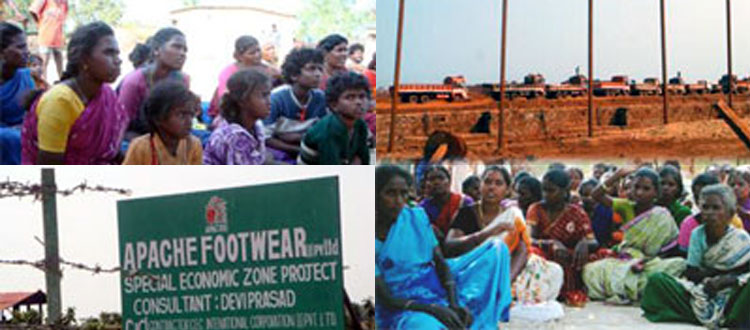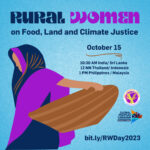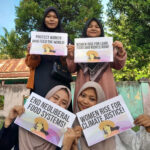International Fact Finding Mission investigated displacement and destruction of livelihoods in Nellore district, Andhra Pradesh (India) due to SEZ and expansion of port
Tirupati, India – An International fact-finding mission, comprising eminent civil society representatives from Thailand, Malaysia, Philippines and India, visited Nellore district of Andhra Pradesh (India) and expressed great concern over the displacement and loss of livelihoods of poor and landless tribal communities in those districts due to construction of Special Economic Zones (SEZ) and expansion of a Port in Krishnapatnam.
The mission observed and verified violations of the right to food and livelihood in Midderevu, Ramalingapuram and N. M. Kandiga ST Colony in Nellore (in Tada) and concluded with a set of observations and recommendations to the Andhra Pradesh government.
The mission observed that due to expansion of the port, four villages were facing threats of imminent eviction and altogether 14 villages were exposed to the threats of livelihood losses.
These villages were mainly inhabited by poor landless tribal and traditional fisher folks who had poor assets and no land title. They depended largely on Common Property Resources (CPR) and fishing in back water and sea for survival. The eviction would result into complete destruction of their livelihoods and would expose them to extreme vulnerable conditions.
The state government had proposed a relocation site for four villages far away from the back water and sea which would jeopardise their livelihoods as fisher folks. Moreover, the landless fisher families, who would be victims of marine and back water pollution would not receive any compensation and/or rehabilitation.
The FFM team observed that these poor villagers were largely uninformed about the expansion of the port during the planning and initial phase of allotment of land and no consultation took place at grassroots to enable them to voice their opinions.
It was further observed by the FFM team that despite several petitions of the villagers, the state authorities did not pay any attention to their pleas of restricting further expansion of the port. Villagers also demanded for land and financial assistance from the state to pursue their livelihoods in a better way; but these demands failed to generate any response.
The FFM team concluded that the new port would create very little employment opportunities for the local people as this would be highly mechanized and the activities in the port would result into large-scale pollution of surrounding environments. The dredging done by the authorities for expansion of the port had already destroyed the breeding ground of the fishes in the backwater and the fisher folks were suffering from poor catches.
In brief the FFM team concluded that expansion of port in Krishnapatnam violated the Right to Food (RTF) of hundreds of households in 14 villages by restricting their access to food and food producing resources and by polluting these resources.
On the basis of these observations, the preliminary recommendations of the FFM in Krishnapatnam, Nellore include the following:
- The violation of RTF should be immediately stopped in and around Krishnapatnam port by restricting further expansion of the port.
- The rights of these landless tribal and traditional families over CPR should be duly acknowledged and reinstated.
- The victims of violations of rights in the above villages should be adequately compensated and rehabilitated. Rehabilitation should be adequate in economic, social and cultural terms.
- The government should immediately take steps to provide these fisher folks with a separate fishing harbour so as to ensure their food security.
- All development planning in this region should ensure effective participation of the villagers with a focus on participation of marginalized communities like the tribal and Dalit groups.
In Tada the FFM team visited N. M. Kandriga ST Colony village and met the representatives of other affected villages and observed how the rights of the tribal people of 12 villages were undermined and violated due to the construction of SEZ in their locality. The FFM team came to know that the Apache Company, which manufactured shoes for national and international markets, set-up a production unit in this SEZ. The Government provided 450 acres of land to this company in this SEZ and another 2000 acres of land would be gradually handed over to other companies for developing production units in this SEZ.
The team observed that due to the construction of this SEZ and fencing of nearby lands the tribal people from 12 villages had no access to nearby grazing grounds, fields and water bodies, which resulted into chronic hunger and malnutrition. These tribal families were landless and had very poor assets for pursuing a safe and sustainable livelihood. They repeatedly urged the government to provide them with two acres of land per family for cultivation but the government never responded to their demands.
On the contrary vast tracts of lands, surrounding the villages, were given to SEZ by the government, making it impossible for these tribal families to derive their livelihoods from CPR. The tribal families also lost employment as agricultural labourers when the government turned over the agricultural lands to the SEZ. The FFM team further observed that there were very limited employment opportunities for these unskilled tribal people in the newly constructed SEZ.
The FFM team concluded that expansion of SEZ restricted the access of these tribal people to CPR like common land, grazing grounds and nearby water bodies and limited their income opportunities to a great extent. These restrictions resulted into hunger and starvations leading to violations of right to food and livelihood. No tribal family received any compensation/rehabilitation from the state for their sufferings. Furthermore the whole expansion of SEZ was done without any consultation with the local people. In brief these landless tribal families remained invisible in the ‘development’ planning of the state government in this area but they became helpless victims of such development process.
On the basis of these observations, the preliminary recommendations of the fact-finding mission in Tada, Nellore include the following:
- The violation of right to food of these tribal people should be immediately stopped and the government should allot two acres of land to each tribal family for cultivation with an immediate effect.
- The rights of these landless families to receive adequate compensation/rehabilitation for the loss of livelihoods should be duly acknowledged and enforced by the state without further delay.
- The land should be given to landless families on a priority basis and the state should refrain from playing the role of intermediary in the land market between the big companies and the land owners for developing SEZ.
The FFM team is urging the government to rethink the SEZ policy and to incorporate a participatory mechanism of social, economic, cultural and environmental impact assessment process, the outcome of which should be made available in public domain.
Moreover, the FFM team is of opinion that the state should give due emphasis on strengthening the capacity of the poor to pursue livelihoods by providing them with resources, assistance and by facilitating their access to productive resources/environment. The macro economic policy of the state should not jeopardise the livelihoods of millions at micro level.
The FFM is jointly organised by Andhra Pradesh VV Union, Pesticide Action Network Asia and the Pacific (PAN AP) and the People’s Coalition on Food Sovereignty (PCFS).
The members of the team include Mr. Ajay Kumar (APVVU, India), Mr. Vince Cinches (PAMALAKAYA, Philippines), Mr. Subramanyam (Human Rights Forum, India), Ms. Ravadee Prasertcharoensuk (SDF, Thailand), Ms. Ujjaini Halim (IMSE, West Bengal India), Mr. P. Chennaiah (NAMP, India) and Mr. Gilbert Sape (PAN AP, Malaysia).
References:
APVVU
P. Chennaiah
Secretary- National Coordination
Andhra Pradesh Vyavasaya Vruthidarula Union -APVVU
No. 6, S.B.I.Colony
CHITTOOR- 517001 A.P. INDIA
Phone: 0091 8572 228592
Fax: 0091 8572 230804
E-mail: apvvu98@sancharnet.in, chennaiah_p@hotmail.com
PANAP
Gilbert M. Sape
Pesticide Action Network Asia Pacific
P.O. Box 1170, 10850
Penang, Malaysia
Tel: +604-6570271 or +604-6560381
Fax: +604-6583960 E-mail: gsape@pan-international.org
PCFS Secretariat
Ms. Norly Grace Mercado
Secretariat
People’s Coalition on Food Sovereignty (PCFS)
P.O. Box 1170, Penang 10850, Malaysia
Tel: 604-6570271 or 604-6560381
Fax: 604-6583960
E-mail: secretariat@foodsov.org







